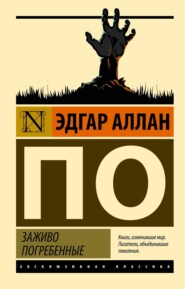По всем вопросам обращайтесь на: info@litportal.ru
(©) 2003-2025.
✖
The Complete Stories of Edgar Allan Poe
Настройки чтения
Размер шрифта
Высота строк
Поля
The stranger continued. “There was the soul of Cratinus – passable! Aristophanes – racy! Plato – exquisite! Not your Plato, but Plato the comic poet – your Plato would have turned the stomach of Cerberus – faugh! Then – let me see – there were Catullus, and Naso, and Plautus, and Quinty – dear Quinty, as I called him when he sung a ‘seculare’ for my amusement, while I toasted him good-humouredly on a fork. But they want flavour, these Romans, one fat Greek is worth a dozen of them, and, besides, will keep, which cannot be said of a Quirite. – Terence, however, was an exception – firm as an Esquimaux, and juicy as a German – the very recollection of the dog makes my mouth water. – Let us taste your Sauterne.”
Our hero had, by this time, made up his mind to the ‘nil admirari,’ and merely filled his visitor’s glass. He was, however, conscious of a strange sound in the chamber, like the wagging of a tail, but of this he took no notice, simply kicking the large water-dog that lay asleep under his chair, and requesting him to be quiet. – The stranger proceeded.
“But, if I have a penchant, Signor Pedro, if I have a penchant, it is for a philosopher. Yet let me tell you, sir, it is not every dev – I mean every gentleman who knows how to choose a philosopher. Long ones are not good, and the best, if not very carefully shelled, are apt to be a little rancid on account of the gall.
“Shelled?”
“I mean taken out of the body.”
“What do you think of a physician?”
“Don’t mention them,” here the stranger retched violently, “ugh! I never tried but one, that rascal – (ugh!) – Hippocrates. Smelt of asafetida – (ugh! ugh!) – took particular pains with the villain too – caught a wretched cold washing him in the Styx – and, after all, he gave me the cholera morbus.”
“The wretch! the abortion of a pill box!” ejaculated Pedro, dropping a tear, and, reaching another bottle of Sauterne, he swallowed three bumpers in rapid succession. The stranger followed his example.
“After all, Signor Pedro,” said he, “if a dev – if a gentleman wishes to live, he must have more talents than one or two, and, with us, a fat face is an evidence of diplomacy.”
“How so?”
“Why we are, sometimes, exceedingly pushed for provisions. You ought to know that, in a climate so sultry as mine, it is frequently impossible to keep a soul alive for more than two or three hours; and after death, unless pickled immediately, (and a pickled spirit is not good) they will smell – you understand – eh? Putrefaction is always to be apprehended when the spirits are consigned to us in the usual way.”
“Good God! how do you manage?”
Here the Arabesque lamp commenced swinging with redoubled violence, and the stranger half started from his seat; however, with a slight sigh, he recovered his composure; merely saying to our hero, in a low tone: – “I tell you what, Pedro Garcia, once for all, we must have no more swearing.”
Pedro swallowed another bumper, and his visitor continued.
“Why there are several ways of managing. – The most of us starve. Some put up with the pickle. For my part, I purchase my spirits vivente corpore, in which case I find they keep very well.”
“But the body, my dear sir, the body!” vociferated the philosopher, for the wine had gotten a little into his head. Here he reached another bottle of Sauterne.
“The body! – well, what of the body? oh! ah! I perceive – why the body is not all affected by the transaction. I have made innumerable purchases of the kind in my day, and the parties never experience any inconvenience. There was Cain, and Nimrod, and Nero, and Caligula, and Dionysius, and Pisistratus, and – and the Jew – and – and a thousand others, all very good men in their way, who never knew what a soul was during the latter part of their lives. Yet these men adorned society. Why isn’t there V—, now? – whom you know as well as I – is he not in full possession of his faculties, mental and corporeal? Who writes a keener epigram? Who reasons more wittily? Who – but I have his agreement in my pocket book.” Thus saying, he drew, from the luminous bag, a book with clasps of cornelian, and, from the book, a bundle of papers, upon some of which Pedro caught a glimpse of the letters MACHIA, MAZA, RICHEL, and the words DOMITIAN and ELIZABETH. From these papers he selected a narrow slip of parchment, and, from it, read aloud the following words: —
In consideration of certain mental endowments, which it would be unnecessary to specify, and in farther consideration of the sum of one thousand Louis d’or, I, being aged one year and one month, do, hereby, from this date, make over, to the bearer of this bond, all my right, title, and appurtenance in the shadow called ‘my soul.’
Done at Paris, this – day of —, in the year of our Lord —, FRANCOIS MARIE AROUET.
“A clever fellow that,” resumed the stranger, “but he was wrong about the shadow – the soul a shadow! – no such nonsense, Signor Pedro. – Only think of a fricaseed shadow!”
“Only think of a fricaseed s – h – a – d – o – w!” echoed our hero, whose faculties were becoming gloriously illuminated, “now, damme,” continued he, “Mr. – humph! – damme! (hiccup) if I would have been such a nincompoop. My soul, Mr. – humph! – yes, sir, my soul.”
“Your soul, Signor Pedro?”
“Yes, sir, my soul is – is – is – no shadow, damme!”
“I should be sorry to suppose, Signor Pedro —”
“Yes, sir, my soul is peculiarly calculated for – for – a stew, damme!”
“Ha!”
“A ragout —”
“Eh?”
“A fricasee —”
“Ah!”
“Or (hiccup) a cotelette – and I’ll let you have it a bargain.”
“Couldn’t think of such a thing,” said the stranger, calmly, at the same time arising from his seat.
Pedro stared.
“Am supplied at present —”
“Eh?”
“Have no cash on hand —”
“What?”
“Very ungentlemanly in me —”
“Humph!”
“To take advantage of —”
“Sir!”
“Your peculiar situation.”
Here the stranger bowed and withdrew, in what manner our philosopher could not exactly ascertain; but, in a well concerted effort to discharge a bottle at the scoundrel, the slender chain was severed that hung from the ceiling, and the metaphysician prostrated by the downfall of the lamp.
THE END
Loss of Breath (1850)
A Tale Neither In Or Out Of “Blackwood”
O Breathe not, etc.
Moore’s Melodies
THE MOST notorious ill-fortune must in the end yield to the untiring courage of philosophy – as the most stubborn city to the ceaseless vigilance of an enemy. Shalmanezer, as we have it in holy writings, lay three years before Samaria; yet it fell. Sardanapalus – see Diodorus – maintained himself seven in Nineveh; but to no purpose. Troy expired at the close of the second lustrum; and Azoth, as Aristaeus declares upon his honour as a gentleman, opened at last her gates to Psammetichus, after having barred them for the fifth part of a century….
“Thou wretch! – thou vixen! – thou shrew!” said I to my wife on the morning after our wedding; “thou witch! – thou hag! – thou whippersnapper – thou sink of iniquity! – thou fiery-faced quintessence of all that is abominable! – thou – thou-” here standing upon tiptoe, seizing her by the throat, and placing my mouth close to her ear, I was preparing to launch forth a new and more decided epithet of opprobrium, which should not fail, if ejaculated, to convince her of her insignificance, when to my extreme horror and astonishment I discovered that I had lost my breath.
Our hero had, by this time, made up his mind to the ‘nil admirari,’ and merely filled his visitor’s glass. He was, however, conscious of a strange sound in the chamber, like the wagging of a tail, but of this he took no notice, simply kicking the large water-dog that lay asleep under his chair, and requesting him to be quiet. – The stranger proceeded.
“But, if I have a penchant, Signor Pedro, if I have a penchant, it is for a philosopher. Yet let me tell you, sir, it is not every dev – I mean every gentleman who knows how to choose a philosopher. Long ones are not good, and the best, if not very carefully shelled, are apt to be a little rancid on account of the gall.
“Shelled?”
“I mean taken out of the body.”
“What do you think of a physician?”
“Don’t mention them,” here the stranger retched violently, “ugh! I never tried but one, that rascal – (ugh!) – Hippocrates. Smelt of asafetida – (ugh! ugh!) – took particular pains with the villain too – caught a wretched cold washing him in the Styx – and, after all, he gave me the cholera morbus.”
“The wretch! the abortion of a pill box!” ejaculated Pedro, dropping a tear, and, reaching another bottle of Sauterne, he swallowed three bumpers in rapid succession. The stranger followed his example.
“After all, Signor Pedro,” said he, “if a dev – if a gentleman wishes to live, he must have more talents than one or two, and, with us, a fat face is an evidence of diplomacy.”
“How so?”
“Why we are, sometimes, exceedingly pushed for provisions. You ought to know that, in a climate so sultry as mine, it is frequently impossible to keep a soul alive for more than two or three hours; and after death, unless pickled immediately, (and a pickled spirit is not good) they will smell – you understand – eh? Putrefaction is always to be apprehended when the spirits are consigned to us in the usual way.”
“Good God! how do you manage?”
Here the Arabesque lamp commenced swinging with redoubled violence, and the stranger half started from his seat; however, with a slight sigh, he recovered his composure; merely saying to our hero, in a low tone: – “I tell you what, Pedro Garcia, once for all, we must have no more swearing.”
Pedro swallowed another bumper, and his visitor continued.
“Why there are several ways of managing. – The most of us starve. Some put up with the pickle. For my part, I purchase my spirits vivente corpore, in which case I find they keep very well.”
“But the body, my dear sir, the body!” vociferated the philosopher, for the wine had gotten a little into his head. Here he reached another bottle of Sauterne.
“The body! – well, what of the body? oh! ah! I perceive – why the body is not all affected by the transaction. I have made innumerable purchases of the kind in my day, and the parties never experience any inconvenience. There was Cain, and Nimrod, and Nero, and Caligula, and Dionysius, and Pisistratus, and – and the Jew – and – and a thousand others, all very good men in their way, who never knew what a soul was during the latter part of their lives. Yet these men adorned society. Why isn’t there V—, now? – whom you know as well as I – is he not in full possession of his faculties, mental and corporeal? Who writes a keener epigram? Who reasons more wittily? Who – but I have his agreement in my pocket book.” Thus saying, he drew, from the luminous bag, a book with clasps of cornelian, and, from the book, a bundle of papers, upon some of which Pedro caught a glimpse of the letters MACHIA, MAZA, RICHEL, and the words DOMITIAN and ELIZABETH. From these papers he selected a narrow slip of parchment, and, from it, read aloud the following words: —
In consideration of certain mental endowments, which it would be unnecessary to specify, and in farther consideration of the sum of one thousand Louis d’or, I, being aged one year and one month, do, hereby, from this date, make over, to the bearer of this bond, all my right, title, and appurtenance in the shadow called ‘my soul.’
Done at Paris, this – day of —, in the year of our Lord —, FRANCOIS MARIE AROUET.
“A clever fellow that,” resumed the stranger, “but he was wrong about the shadow – the soul a shadow! – no such nonsense, Signor Pedro. – Only think of a fricaseed shadow!”
“Only think of a fricaseed s – h – a – d – o – w!” echoed our hero, whose faculties were becoming gloriously illuminated, “now, damme,” continued he, “Mr. – humph! – damme! (hiccup) if I would have been such a nincompoop. My soul, Mr. – humph! – yes, sir, my soul.”
“Your soul, Signor Pedro?”
“Yes, sir, my soul is – is – is – no shadow, damme!”
“I should be sorry to suppose, Signor Pedro —”
“Yes, sir, my soul is peculiarly calculated for – for – a stew, damme!”
“Ha!”
“A ragout —”
“Eh?”
“A fricasee —”
“Ah!”
“Or (hiccup) a cotelette – and I’ll let you have it a bargain.”
“Couldn’t think of such a thing,” said the stranger, calmly, at the same time arising from his seat.
Pedro stared.
“Am supplied at present —”
“Eh?”
“Have no cash on hand —”
“What?”
“Very ungentlemanly in me —”
“Humph!”
“To take advantage of —”
“Sir!”
“Your peculiar situation.”
Here the stranger bowed and withdrew, in what manner our philosopher could not exactly ascertain; but, in a well concerted effort to discharge a bottle at the scoundrel, the slender chain was severed that hung from the ceiling, and the metaphysician prostrated by the downfall of the lamp.
THE END
Loss of Breath (1850)
A Tale Neither In Or Out Of “Blackwood”
O Breathe not, etc.
Moore’s Melodies
THE MOST notorious ill-fortune must in the end yield to the untiring courage of philosophy – as the most stubborn city to the ceaseless vigilance of an enemy. Shalmanezer, as we have it in holy writings, lay three years before Samaria; yet it fell. Sardanapalus – see Diodorus – maintained himself seven in Nineveh; but to no purpose. Troy expired at the close of the second lustrum; and Azoth, as Aristaeus declares upon his honour as a gentleman, opened at last her gates to Psammetichus, after having barred them for the fifth part of a century….
“Thou wretch! – thou vixen! – thou shrew!” said I to my wife on the morning after our wedding; “thou witch! – thou hag! – thou whippersnapper – thou sink of iniquity! – thou fiery-faced quintessence of all that is abominable! – thou – thou-” here standing upon tiptoe, seizing her by the throat, and placing my mouth close to her ear, I was preparing to launch forth a new and more decided epithet of opprobrium, which should not fail, if ejaculated, to convince her of her insignificance, when to my extreme horror and astonishment I discovered that I had lost my breath.

















